BY DONALD E. MCCANDLESS
(Please understand that the answers to these questions are general in nature and may not cover every individual situation.)
If you or a loved one have been arrested for and charged with a felony, it can be a frightening and devastating experience. In the State of Utah, the possible penalties for felonies range from zero to five years in prison for third degree felonies, to five years to life for first degree felonies. Some first degree felonies (especially sex offenses), have minimum mandatory sentences attached to them. Capital offenses such as aggravated murder may carry the death penalty. Procedure in felony cases is much more complicated than it is in misdemeanor cases. In a felony case, after an arrest, the first hearing is normally a bail hearing. At a bail hearing a probable cause statement will be presented to the judge, and a bail amount will be set. The next hearing is a felony first appearance where the defendant is given a copy of a document called an information. The information is the document that indicates what charges are being filed. Usually a week or two after the first appearance hearing, the court will schedule a waiver hearing, or roll call hearing. The purpose of this hearing is to determine whether the defendant will ask to have the case set for preliminary hearing or will waive preliminary hearing. Plea bargains often occur at this stage of the proceedings.
A preliminary hearing is a hearing that is held to determine whether or not the defendant should have to appear for an arraignment on the charges. A preliminary hearing is an evidentiary hearing where the prosecution is required to put on enough evidence to allow the judge to determine that the defendant “probably” committed the crime. At a preliminary hearing the normal rules of evidence are not strictly followed. The defendant can put on evidence but usually does not do so as the prosecution has the burden of proof.
Arraignment is a hearing where a defendant is required to plead guilty, not guilty or no contest. A guilty plea results in proceeding to sentencing. A not guilty plea results in setting the case for trial. If a case is set for trial, often there are motion hearings held between the arraignment and the trial.
Trials in felony cases are usually before juries unless the defendant waives the jury at arraignment. If there is a waiver at arraignment the case can be tried to the bench. (Before a Judge). Once a case is set for a jury trial the prosecutor must agree before the case can be tried to the bench.
Can an attorney help in defending a felony case? Because the consequences of felony charges are so serious, most defendants have attorneys in felony cases. In a felony case the attorney appears at all hearings. They can argue for lower bail or release on recognizance. Through the discovery process they can obtain copies of all of the documents and exhibits the prosecution is relying on in building its case. The attorney can negotiate with the prosecutor for amendment or even dismissal of the charges. The attorney can help counsel with and advise the defendant regarding what should be done with the case. The attorney can evaluate the discovery provided by the prosecution, and in appropriate cases can file motions to suppress the evidence. The attorney can appear at trial. The attorney can also appear at sentencing and work to minimize consequences in the case of a guilty plea or guilty verdict. The attorney can help you file an appeal.


Sorry, the comment form is closed at this time.